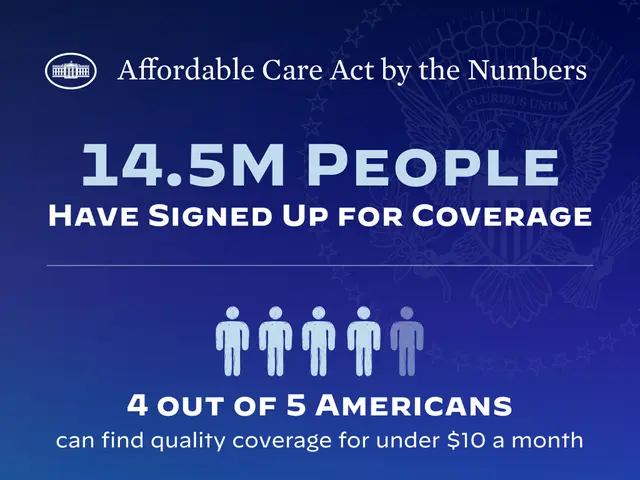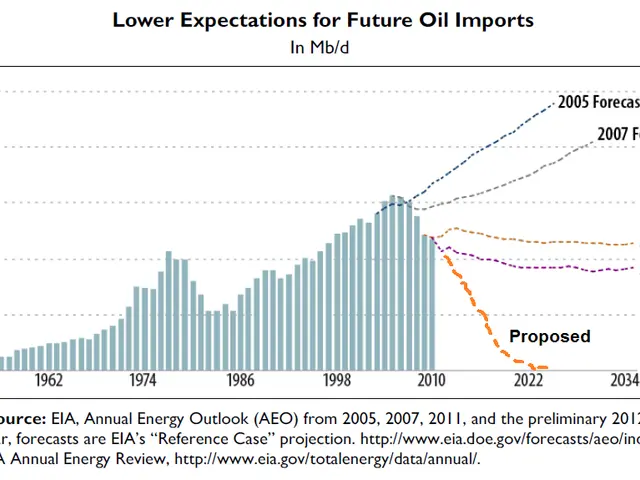Federal Health Minister Ardently Petitions for a Significant Monetary Injection Amounting to $1 Billion from the Government's Treasury
Hey there! Let's dive into the latest drama unfolding in Germany's federal government. The Health Minister is raising the roof and demanding a billion-dollar injection from the top dogs, claiming it's the only way to prevent a health insurance catastrophe.
"The health insurance funds are in a brutal pickle," she said in a chat with German Press Agency. "We can't just sit around twiddling our thumbs until 2027 while the commission figures out the solution," she exclaimed.
So, what's her plan? Well, it involves some extra tax revenue in the billions for those darn health insurance funds. She's talking about the cash contributions the government throws to unemployment benefit recipients. "The problem is glaring as day," she declared. "The job center's contributions ain't enough to cover their healthcare costs. Something's got to give," she warned.
According to calculations from the health insurance funds, the government owes an additional 10 billion euros to truly cover the healthcare costs of unemployment benefit recipients. Ouch!
The Health Minister also didn't forget to bring up the long-term care insurance's desperate need for a financial lifeline. "The feds owe long-term care insurance over five billion euros for pandemic expenses, like tests and the care protection shield," she stated. "They need some compensation for that," she insisted. After all, it's the duty of society to lend a helping hand in times like these.
In the long-term care insurance, "we've got some pressing issues," she admitted. "We need to buy some time to tackle the necessary reforms," she explained. The federal-state working group for this task will be set up soon by the coalition, but it'll still take some time for results to roll in. "In the meantime, short-term measures to stabilize the long-term care finances are crucial," she emphasized.
So, what's the plan? The Health Minister suggests a sit down with the coalition to discuss this billion-dollar issue. "It's not about a single demand, but a comprehensive package," she stressed. Experts predict a deficit of up to 5.8 billion euros in the long-term care insurance this year.
Both the 10 billion from the federal government for the health insurance of unemployed citizens and the settlement of corona debts were proposed by the health working group during the coalition negotiations between the Union and the SPD, but they didn't make the final cut.
Stay tuned for updates on this billion-dollar health battle! In the meantime, you can keep an eye on health policies in Germany and their potential impacts on premiums and budgets. Keep in mind that the global health insurance market is forecasted to grow due to increased demand and medical costs, and the pharmaceutical industry is facing challenges such as patent cliffs and competition from generics and biosimilars.
Sources:
- Pharmaceutical Research and Manufacturers of America (PhRMA). (n.d.). Fact sheet: Access to medicines in the Affordable Care Act. Retrieved May 20, 2023, from https://www.phrma.org/sites/default/files/u2/uploads/2017/06/Access-to-Medicines-Fact-Sheet_0.pdf
- Deloitte Insights. (n.d.). Health insurance premium growth to outpace other segments due to rising demand and medical cost inflation. Retrieved May 20, 2023, from https://www2.deloitte.com/content/dam/insights/us/articles/6770_nhc-us-health-insurance-premiums-to-outpace-other-segments-due-to-rising-demand-medical-cost-inflation/DI_US_Report-Health-Insurance-Premiums-to-Outpace-Other-Segments-due-to-Rising-Demand-Medical-Cost-Inflation_cnb_18_05_20_vFinal.pdf
- Ernst & Young. (n.d.). Patent cliffs and pricing turbulence: Navigating a choppy route for biosimilar players. Retrieved May 20, 2023, from https://www.ey.com/en_us/Biopharma/Patent-cliffs-and-pricing-turbulence-Navigating-a-choppy-route-for-biosimilar-players
- The Economist. (2021, September 17). The new age of drug prices in Europe. Retrieved May 20, 2023, from https://www.economist.com/europe/2021/09/17/the-new-age-of-drug-prices-in-europe
- The Health Minister's demands for a billion-dollar injection for health insurance in Germany highlight the urgent need for legislative action on community health insurance, particularly for unemployment and long-term care benefits.
- As the global pharmaceutical industry faces challenges such as patent cliffs and competition from generics and biosimilars, it is essential to consider the potential impacts of health policies on both premiums and budgets in the context of rising medical costs and increased demand.
- Against the backdrop of general news reports on the coronavirus pandemic, the financial requirements for unemployment and long-term care benefits, as well as the health-and-wellness industry's broader response to medical-conditions, have become political issues requiring careful examination and informed debate between stakeholders, including medical experts, policymakers, and the public.







